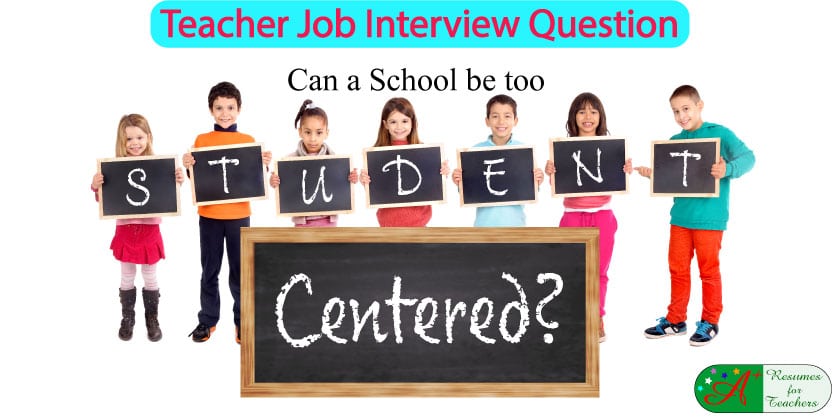Do you think a school can be too student-centered? How would you answer that school teacher or principal interview question? Learner-centered can be a term to describe this type of school community environment.
It is important that the response you give to the job interview question is truthful, relevant to the position, and shows value to the school district. The following could be a possible answer, or it may provide some ideas for you to tailor your response:
I think it is possible that a school can be too student-oriented if it is done at the price of ignoring other important areas of student education. A school’s primary focus should always be to help students achieve social and academic success. And a student-oriented school should use this concentrate in every area of education.
For instance, a student-oriented school should use this philosophy when planning – plans should be dynamic and may change with significant news events and individual student interests. Teachers always strive to create the perfect lesson, one that is student-centered and teaches to the state standards. Sometimes it does go as planned, and students don’t engage. When this happens, I need to adjust the direction of the lesson quickly.
When scheduling, it is important to allow for variations resulting from pacing projects, student moods, and checking-in; when pacing/achievement – high achievers should have opportunities to go deeper, more complicated, and more involved in the curriculum. When testing and assessing, tests should be used to determine each student’s specific needs and modify schedules and plans according to these requirements.
Assessments should provide feedback and guidance about what was successful and what to improve. With focus and activities, students should develop high-level skills, self-confidence, self-awareness, quality products, and student interests and questions guide lessons.
“Student-centered learning does have risks, but so do the alternatives. We do not have enough resources to be acutely aware of each student’s individual optimums or teach each student according to their individual optimum. Demanding perfect student-centered approaches from teachers will overwhelm them with more work than they can do. Also, when teachers place too much emphasis on students’ individual styles, they may use up too much time and fail to cover critical material.
On the other extreme, though, when schools demand curriculum-centered or test-centered learning, teaching tends to focus on the lowest cognitive levels. Students may get treated as test scores and academic rank, not as individuals.
Students tend to gain knowledge without gaining understanding. Students often become bored and limit their learning to short-term memory. Students may get higher test scores, but they don’t rise to higher achievement.
A balance must be found! Student-centered education may fail to cover important material, but curriculum-centered education may fail to promote real achievement.


